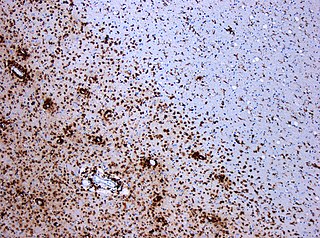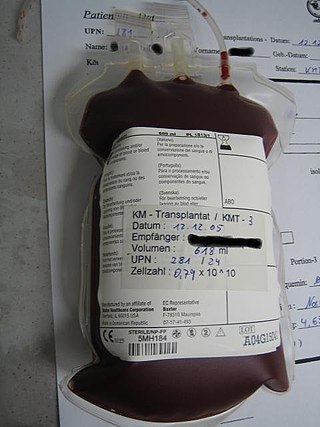Related Research Articles

Multiple sclerosis (MS) is an autoimmune disease in which the insulating covers of nerve cells in the brain and spinal cord are damaged. This damage disrupts the ability of parts of the nervous system to transmit signals, resulting in a range of signs and symptoms, including physical, mental, and sometimes psychiatric problems. Specific symptoms can include double vision, vision loss, eye pain, muscle weakness, and loss of sensation or coordination. MS takes several forms, with new symptoms either occurring in isolated attacks or building up over time. In the relapsing forms of MS, between attacks, symptoms may disappear completely, although some permanent neurological problems often remain, especially as the disease advances. In the progressive forms of MS, bodily function slowly deteriorates and disability worsens once symptoms manifest and will steadily continue to do so if the disease is left untreated.

Jack Joseph Osbourne is a British-American media personality. He is the son of heavy metal singer Ozzy Osbourne, and Sharon Osbourne. He starred on MTV's reality series The Osbournes (2002–2005), along with his father, mother Sharon, and sister Kelly. Osbourne has since pursued a career as a fitness and travel reporter, presenting shows such as Jack Osbourne: Adrenaline Junkie (2005–2009) and BBC's Saving Planet Earth (2007). In 2016, he and his father Ozzy travelled the world in the History Channel reality series Ozzy & Jack's World Detour.

Hematopoietic stem-cell transplantation (HSCT) is the transplantation of multipotent hematopoietic stem cells, usually derived from bone marrow, peripheral blood, or umbilical cord blood in order to replicate inside of a patient and to produce additional normal blood cells. It may be autologous, allogeneic or syngeneic.

A demyelinating disease refers to any disease affecting the nervous system where the myelin sheath surrounding neurons is damaged. This damage disrupts the transmission of signals through the affected nerves, resulting in a decrease in their conduction ability. Consequently, this reduction in conduction can lead to deficiencies in sensation, movement, cognition, or other functions depending on the nerves affected.
Neuromyelitis optica spectrum disorders (NMOSD) are a spectrum of autoimmune diseases characterized by acute inflammation of the optic nerve and the spinal cord (myelitis). Episodes of ON and myelitis can be simultaneous or successive. A relapsing disease course is common, especially in untreated patients.
Interferon beta-1b is a cytokine in the interferon family used to treat the relapsing-remitting and secondary-progressive forms of multiple sclerosis (MS). It is approved for use after the first MS event. Closely related is interferon beta 1a, also indicated for MS, with a very similar drug profile.

Cladribine, sold under the brand name Leustatin, among others, is a medication used to treat hairy cell leukemia and B-cell chronic lymphocytic leukemia. Cladribine, sold under the brand name Mavenclad, is used for the treatment of adults with highly active forms of relapsing-remitting multiple sclerosis.
Primary lateral sclerosis (PLS) is a very rare neuromuscular disease characterized by progressive muscle weakness in the voluntary muscles. PLS belongs to a group of disorders known as motor neuron diseases. Motor neuron diseases develop when the nerve cells that control voluntary muscle movement degenerate and die, causing weakness in the muscles they control.
Roger MacDougall was a Scottish playwright, screenwriter and director.
Multiple sclerosis (MS) is a chronic inflammatory demyelinating disease that affects the central nervous system (CNS). Several therapies for it exist, although there is no known cure.
Inflammatory demyelinating diseases (IDDs), sometimes called Idiopathic (IIDDs) due to the unknown etiology of some of them, are a heterogenous group of demyelinating diseases - conditions that cause damage to myelin, the protective sheath of nerve fibers - that occur against the background of an acute or chronic inflammatory process. IDDs share characteristics with and are often grouped together under Multiple Sclerosis. They are sometimes considered different diseases from Multiple Sclerosis, but considered by others to form a spectrum differing only in terms of chronicity, severity, and clinical course.

Marburg acute multiple sclerosis, also known as Marburg multiple sclerosis or acute fulminant multiple sclerosis, is considered one of the multiple sclerosis borderline diseases, which is a collection of diseases classified by some as MS variants and by others as different diseases. Other diseases in this group are neuromyelitis optica (NMO), Balo concentric sclerosis, and Schilder's disease. The graver course is one form of malignant multiple sclerosis, with patients reaching a significant level of disability in less than five years from their first symptoms, often in a matter of months.

Multiple sclerosis can cause a variety of symptoms: changes in sensation (hypoesthesia), muscle weakness, abnormal muscle spasms, or difficulty moving; difficulties with coordination and balance; problems in speech (dysarthria) or swallowing (dysphagia), visual problems, fatigue and acute or chronic pain syndromes, bladder and bowel difficulties, cognitive impairment, or emotional symptomatology. The main clinical measure in progression of the disability and severity of the symptoms is the Expanded Disability Status Scale or EDSS.

Chronic cerebrospinal venous insufficiency is a term invented by Italian researcher Paolo Zamboni in 2008 to describe compromised flow of blood in the veins draining the central nervous system. Zamboni hypothesized that it might play a role in the cause or development of multiple sclerosis (MS). Zamboni also devised a surgical procedure which the media nicknamed a liberation procedure or liberation therapy, involving venoplasty or stenting of certain veins. Zamboni's ideas about CCSVI are very controversial, with significantly more detractors than supporters, and any treatments based on his ideas are considered experimental.
Malignant multiple sclerosis is used to describe MS patients who reach significant level of disability in a short period of time. Malignant MS cases are not common, less than 5% of patients with MS experience this type of progression.
Terry Lynn Wahls is a physician who was an assistant chief of staff at Iowa City Veterans Administration Health Care and is a clinical professor of medicine at the University of Iowa. She has a private practice and conducts clinical trials. She was diagnosed with a chronic progressive neurological disorder and secondary progressive multiple sclerosis. Wahls is a promoter of functional medicine.
There are several ways for pharmaceuticals for treating multiple sclerosis (MS) to reach the market.
George Jelinek is an Australian doctor who is professor and founder, Neuroepidemiology Unit, Melbourne School of Population and Global Health. This unit expressly evaluates modifiable risk factors that predict the progression of Multiple sclerosis. He has served since 2017 as the Chief Editor for Neuroepidemiology in the journal Frontiers in Neurology, and he was Founding Editor – and is currently the Editor Emeritus – for Emergency Medicine Australasia. Jelinek also has the distinction of being the first Professor of Emergency Medicine in Australasia. Between 1987 and 2018, he published more than 150 peer-reviewed papers, seven book forewords and eight books, and received more than 20 research grants. He is a frequent invited speaker.
Anne Cross is an American neurologist and neuroimmunologist and the Section Head of Neuroimmunology at Washington University School of Medicine in St. Louis, Missouri. Cross holds the Manny and Rosalyn Rosenthal–Dr. John L. Trotter Endowed Chair in Neuroimmunology at Washington University in St. Louis School of Medicine and co-directs the John L Trotter Multiple Sclerosis Clinic at Barnes-Jewish Hospital. Cross is a leader in the field of neuroimmunology and was the first to discover the role of B cells in the pathogenesis of multiple sclerosis (MS) in animals and then in humans. Cross now develops novel imaging techniques to observe inflammation and demyelination in the central nervous systems of MS patients for diagnosis and disease management.
Multiple Sclerosis Australia, commonly referred to as MS Australia, is a prominent national non-profit organization with a primary focus on research and advocacy in support of individuals affected by Multiple Sclerosis (MS). This organization achieved official registration as a charitable entity in Australia in the year 1975. As of July 2021, there are over 25,000 people living with multiple sclerosis in Australia and MS Australia serves as the peak body for all Australians living with or otherwise affected by MS.
References
- ↑ Bailey, Meredith (21 October 2013). "Matt Embry". Avenue Calgary.
- ↑ Taylor, Kate (August 9, 2017). "New Canadian talent shines in TIFF's Discovery program". The Globe & Mail. Retrieved 5 August 2020.
- ↑ Paine, Herbert (March 6, 2019). "BWW Review: Living Proof Proves Hope Is Alive for People With MS". BroadwayWorld.com. Retrieved June 15, 2020.